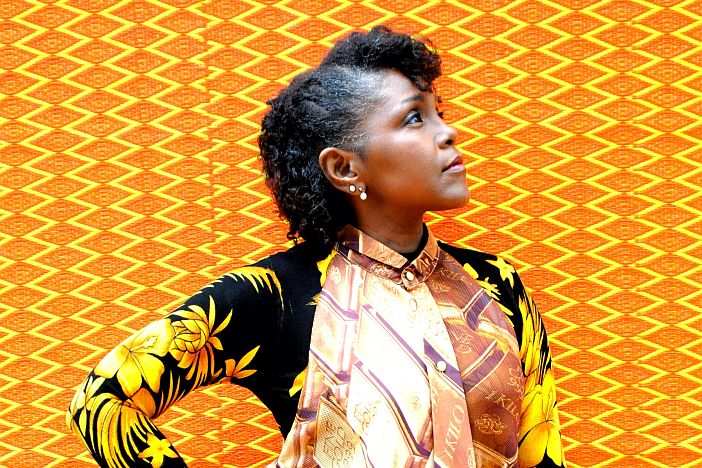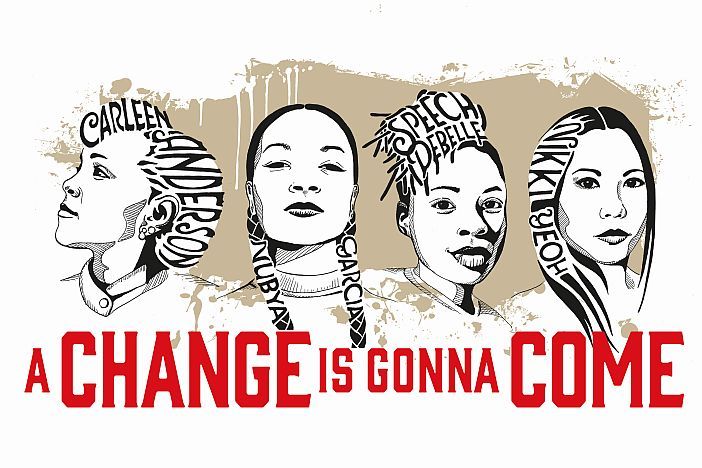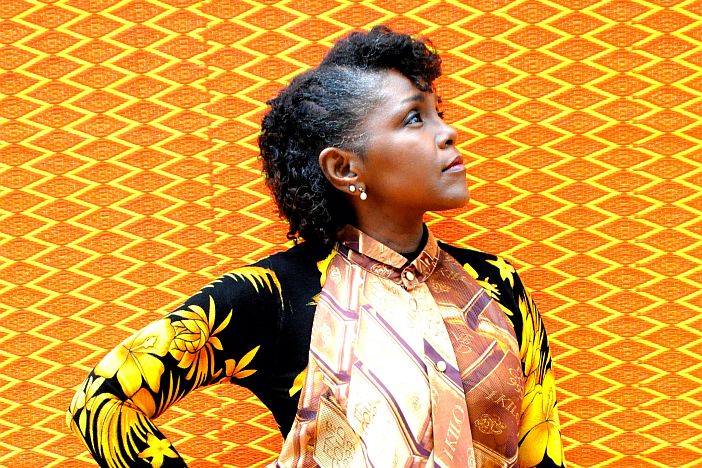Carleen Anderson kindly took time from her busy schedule to answer some questions about her career and her collaborative show in Brighton Festival.
You first gained recognition with The Young Disciples. How did you all come together and are you still in touch with Femi and Marco?
Marco and Femi approached me in 1989 to join a group they were putting together when we met during a tour they’d organised for my stepfather’s band, Bobby Byrd and the JB All Stars. Marco and Femi are like brothers to me. We will always stay in touch.
You have lived in the UK for some time. Is this home for you now?
Yes, my son and I have called the UK our home since we relocated here in 1990.
Is your son Bobby still based in Bristol and making music?
Yes, my son Bobby still lives in Bristol where he’s been since he went to Uni there back in 1998. He continues to make and perform his music locally in Bristol and abroad.
Did you realise your mum and stepfather were famous performers or was it just a ‘normal’ childhood? Did you ever go on the road with James Brown and was your musical awakening gained from your grandparents and/or church?
As I was raised from infancy by my paternal grandparents, long before my birth mother joined the James Brown Show & Revue. Most of what I knew about her and my stepfather being famous entertainers was by seeing them on TV or hearing of them on the radio. Up until I was a teenager, I only saw them about once or twice a year when they’d arrive in town to perform at a concert. Never did I go on the road with James Brown. The bulk of my musical upbringing stems from the Pentecostal Gospel church. Born and raised in Texas, those sounds were heavily blended with country and western music. As I neared my teens, R&B/soul filtered in which was then followed by funk. By the time I was at music college, jazz and classical music deeply influenced my sound. All in all, there have and continues to be a series of musical awakenings that flavour how I interpret and translate music.
Your ‘Cage Street Memorial’ project is based on your family history. How did this come to fruition and how did you find the research process?
‘Cage Street Memorial’, my tribal opera is a tracing of my family history from my paternal grandfather’s birth in Mississippi, USA circa late 1800s, to my son’s current life in 21st century Bristol, UK, with an emphasis on the evolution of society over that 100-year period. The narrative traces the lineage I’d wanted to showcase since I was three years old. Fascinated by the recollections my paternal grandparents shared with me of their lives, watching the theatrical expressions of my paternal grandfather as the pastor of his church, seeing how my paternal grandmother organised the family, combined with the generational developments inspired me to collate all the info and influences I had gathered throughout my life and put them into a music and stage production which resulted in ‘Cage Street Memorial’.
Do you return to the USA very often and have you noticed a change since the new presidency began?
Long before this current administration began I’d planned to leave the US. When possible, I avoid returning to the USA. Globally, divisionary tactics in governmental politics have always been in play. The pendulum has just swung back to being more out in the open again.
Your Brighton Festival show is called ‘A Change Is Gonna Come’ after the Sam Cooke song. What are the ingredients that make a great protest song?
A ‘great protest song’ is subject to perception but like any tune that has staying power, it generally tends to have a memorable melody with relatable, easy-to-sing-along-to lyrics and appeals to a large sector of society, across barriers. As with all art, the enjoyment of it is usually based on a feeling and often beyond a specific description.
The show features some other great talents such as Nikki Yeoh and Speech Debelle – have you worked with either of them before?
I’m really looking forward to my first time working with award winners Nikki Yeoh, Speech Debelle and Nubya Garcia, as well as drummer, Rod Youngs. For several years I’ve been working with bassist Renell Shaw who is also a great talent in his own right. We first worked together on ‘Cage Street Memorial’.
You were a guest at the Billie (Holiday) & Me tribute concert at The Barbican back in 2004. She famously sang one of the greatest songs of the civil rights era, ‘Strange Fruit’. Will this piece be in the Brighton show and does the protest song still live on in contemporary music?
‘Strange Fruit’ is a song I’ve sung since I was a teenager and it was one of my first choices for our setlist. However, a variety of songs were suggested by the team resulting in several favourites being cut. The protest song certainly does live on in contemporary music though which you’ll hear its vibe in our concert.
It’s 50 years since Dr King’s assassination and Donald Trump is in the White House siding with white supremacists. It seems like we’ve gone full circle back to the 1960s. Is non-violent protest still the best approach?
Violence begets violence. That is fact. As necessary as it might be to resort to violence in times of self-defence and such, ultimately, causing harm to others generates and escalates hatred and revenge. Instinctively we all know this manner of being leads to our mutual destruction. Once enough people figure out how to make peace be a financially profitable business, that will turn folks to seeing the benefit to themselves of treating each other better.
You taught at BIMM for seven years. How did this association begin and what are your memories of that time?
The former drummer in my son’s band asked me to perform with his fellow students for his end of term class assignment at the Academy of Music in Guildford. At this event I met their then Head of Music, Bruce Dickinson. Bruce began BIMM in 2002 and asked me to be one of the first teachers for a new music school. Decades before, I’d studied to be a music teacher at the University of Southern California, (USC). It was fulfilling to finally teach music as my training had prepared me for and to be appointed as the Head of the Vocal Department at BIMM. There is such joy in witnessing the light that students shine when they express how much exploring music means to them. The position at BIMM also resulted in me singing for and meeting the queen in 2007 at the Brighton Theatre Royal.
Do you have any more vocal masterclasses planned?
When my schedule allows, I try to teach a masterclass at least once a year.
Do you get back to Brighton very often?
Brighton is one of my favourite places on the planet and when possible, I visit as often as I can. Admittedly, time demands makes that less than I’d like. If I could, I’d wake up on Brighton Beach every morning.
Are you aware of the Brighton Festival curator David Shrigley’s work and will you be attending any events during the festival?
It’s been inspiring learning of David Shrigley’s work through his being the curator for this year’s Brighton Festival. Circumstances prevent me from attending the festival events this year which I’ll be sad to miss as I know from experience as an audience member of previous Brighton Festivals, they are always splendid.
What are your plans for the rest of the year?
Alongside various featured guest performances abroad and in the UK, I’ve been commissioned to compose music for several projects this year. Additionally, I’m developing my next tribal opera.
Thanks again and best of luck with the Brighton concert.
Thanks so much. We are all excited about performing this music in Brighton.
A Change Is Gonna Come is at Brighton Dome Concert Hall on Tuesday 22 May at 7:30pm. Tickets are available here
Photo by Hassan Hajjaj



